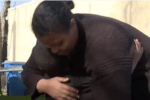From chapter 2 (“Growing Up Broken”) of Penny Maxwell’s new book, Setting Broken Bones
You wouldn’t have liked my childhood any more than I did. I’ll sum it up this way: At first my family was poor and quite miserable. Then great pain hit me like a freight train. Then we became quite rich and were still miserable. Then I left home.
Like a lot of people, I had to forgive nearly every important adult in my life for doing some really hurtful stuff. Half healed, I launched into independence as soon as I could, scurrying away from the harm and the pain that had marred my childhood home. Out there alone I was perfectly poised for a whole bunch of bone resetting I didn’t know I needed because so much had been shattered.
I was about to find out exactly what was wrong with me.
A Blue Pinto and a Church Bus
My unmarried mother got pregnant with me in 1971 three months after giving birth to my half brother, who was the son of another man. Facing a whole heap of potentially public shame, Mom could have given in to the pressure from my biological father to have me aborted. Instead, she was able to persuade him to marry her, support my birth, adopt my half brother, and pretend that both of us were his own. I can only assume he did this so that my mother’s indiscretions would remain unknown. Their marriage ended rather quickly, and my slightly older brother and I grew up with Mom, thinking we had the same father. Over the next few decades, my two biological parents would end up with eight marriages between them. In my opinion, they were heartache factories and unhappy people.
My first memories are of Mom, my brother, and me living in a small run-down first-floor apartment, where I remember seeing her boyfriends come and go through our door. Our car was a baby-blue Ford Pinto that barely kept running. I remember her eating potato chips, or something like it, for dinner, and it always seemed that if something good happened to us, it was because my grandparents were behind it. They gave Mom money and bought clothes and things for us.
One Sunday morning a church bus rumbled up to our apartment complex, and Mom let me get on that bus by myself to attend a little Baptist church. She didn’t come, and neither did my brother, but from that point on I didn’t miss that bus. Church was the happiest place I knew. In kids’ church I said my memory verse and got candy. Everybody was nice to me and to everyone else. From that time on—perhaps even before then—I never had to be convinced that God was real and that I loved Him. I was only four years old, and while there were pieces of my life that I didn’t understand, what I felt on that bus and what I heard at the neighborhood church made heart sense to me.
For the most part, by contrast, our home felt joyless. I did not feel safe or protected in my bedroom but isolated. I can recall sitting on my bed, examining the marks on my legs after one of our family explosions. Sometimes the marks on my legs showed the outline of a belt strap and holes. It didn’t bother me because I thought this was the same for every girl. I didn’t know to be ashamed of it, and I’m not sure I would have hidden it anyway. I remember one time when a family member noticed the marks and mentioned them to my mom, but it didn’t change much. Neither my bedroom nor anywhere else in the apartment ever felt safe.
Because of my developing need to feel protected and loved, my heart went out to anyone in need and especially to those who were bullied at school. I stepped in and looked out for people when others picked on them, and anytime I saw a neighbor in need, I rushed to help however I could. This brought me joy.
Myrtle Beach
Relationships didn’t seem to be Mom’s strong point. One experience summed this up vividly in those early years. I don’t remember where my brother was, but Mom and some guy she was dating took me with them on a trip to a condo in Myrtle Beach. It was what people now call a breakup trip, but that was way beyond my understanding at the time. All I remember is that they began fighting, and things got out of control, emotionally and physically. I was clearly in the way, and because they wanted time alone to have a conversation—or a fight—the man’s parents arrived to take me out for a little while. These were perfect strangers to me, though not unpleasant-seeming people. Still, I didn’t want to go. His father did a couple of coin tricks—taking a coin out of my ear, for example—to build a bridge, but I was four years old and not ready to go anywhere with people I’d never seen before.
“Listen, she doesn’t know us. It’s not right to force her,” I remember the mother saying as I cried and cried. When they left and it was just the three of us again, I remember Mom putting me in a closet.
“You can’t come out,” she said. “I’m having a grownup conversation.”
Of course I came out and saw her crying too. Then she put me on the balcony. It was dark, and the wind was blowing. I heard her lock the sliding glass door and saw her close the curtain. Thank goodness I don’t remember how long I was out there while in that sad room their relationship dissolved.
Dad
My biological dad’s charm and charisma could command an entire room, but he had no moral compass whatsoever, as far as I could detect. He drank heavily, drove a sporty GTO car, and was able to function well enough to work even after downing most of a bottle of Jack Daniel’s whiskey.
In his closet at his apartment he hung his T-shirts neatly and in order. He wore only T-shirts and jeans, and at times, I flipped through the shirts and tried to read the words and understand the meanings. In time it dawned on me that every single one of them was vulgar and some were graphic. Many bore curse words. As a rather innocent little girl I was dumbfounded that my father wore such off-color shirts. Yet this was his daily garb.
I usually visited him once a year, at Christmas, and one year he was talking about the fact that my brother was dealing with acne. As usual Dad was drunk.
“I’m really concerned that in a year I’ll struggle with acne too because my brother is,” I said.
Dad smiled knowingly and said, “Sweetheart, you don’t ever need to worry about that. You won’t have to deal with acne.”
“You don’t know that,” I responded.
“Kid, you come from good stock. Don’t worry about it,” he said.
“What are you talking about?” I asked.
“PJ,” he said to me, using my nickname, which was short for Penny Jean, “your brother is adopted. I adopted him to save face for your mother.”
My Grandfather, The Abuser
By this time, my grandfather had been sexually abusing me for years. Of course I didn’t understand what was going on. I just knew I couldn’t trust him, and I did all I could to avoid being near him.
School was a safe place. I wasn’t an over-the-top-excellent student, but I loved being with people, talking with people, and helping people. If my teacher needed assistance, I was the first to jump in. School felt like level ground. Nothing harmful could reach me there.
But if I wasn’t feeling well, my mother would call my grandfather to pick me up, and I knew what that meant. So I went to school even if I felt sick and tried to hold it together. This didn’t always work. One day in third grade my teacher noticed I wasn’t feeling well, though I insisted, “I feel fine.” There was no way I was going home if I could help it, because I knew what would happen to me there. My teacher had me sit in the hallway, and there I threw up all over the place. So she sent me to the nurse’s office.
Crying, I kept saying, “I feel good. It was an accident. I didn’t mean it.”
But it didn’t help. The next thing I knew, my grandfather was in the nurse’s office to pick me up. You can guess what happened after that.
The Promise of a Better Future
Since those days at the Baptist church, I had truly loved God, and while I didn’t understand why I had to go through things I did, I never blamed God for them. I knew that individual people had power to make choices, even wrong ones. I certainly asked, “Why?” a lot and wondered why people didn’t protect me. But I didn’t point the finger at God.
A little wooden cross with a rawhide strap hung on my bedpost. Every night, I put it over my neck as I went to bed and prayed, “God, I know You’re there. I don’t know why all this is happening.” That cross necklace and that routine gave me comfort. I knew that as bad as everything was, it wasn’t God’s fault. While I slept, the cross lay against my neck like a promise of a better future. {eoa}
Read articles like this one and other Spirit-led content in our new platform, CHARISMA PLUS.






Leave a Comment
You must be logged in to post a comment.